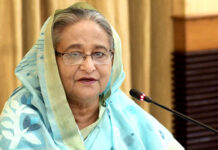By Kamran Reza Chowdhury on Sep 06, 2023 Benar News
Russian Foreign Minister Sergey Lavrov arrives in Bangladesh on Thursday, the nation’s first-ever visit by a high-profile Russian official that is expected to focus on how Dhaka can pay Moscow for construction of a nuclear plant despite Western sanctions.
Reports suggest that Russia – cornered by Western sanctions over the war in Ukraine – may want to step up ties with Bangladesh, which Moscow recently defended against Western criticism over concerns about human rights and free and fair elections.
Talks between Lavrov and officials in Dhaka also are expected to focus on finding a solution for easing gridlock over Bangladesh’s repayment of its loans for a Russian-built nuclear energy station.
“Lavrov’s is a welcome visit for Bangladesh,” said Muhammad Faruk Khan, a senior lawmaker from the ruling party who heads a parliamentary committee on foreign affairs, told BenarNews on Wednesday.
“Bangladesh will urge Lavrov to take measures to stop the war in Ukraine. We are against all wars. But at the U.N., we will not name Russia in condemnation resolutions on Ukraine,” he said, adding that Bangladeshi officials would also be drawing attention to the war’s fallout on Bangladesh’s economy.
On the world stage, Dhaka has refrained from explicitly siding with Moscow and President Vladimir Putin over the invasion of Ukraine.
Prime Minister Sheikh Hasina, however, has repeatedly voiced concerns about the impact of the Western sanctions against Russia on developing economies. She has also ratcheted up her anti-U.S. rhetoric due to Washington’s outspoken stance on the state of democracy and human rights in Bangladesh.
Russia’s top diplomat will travel to Dhaka from ASEAN meetings in Jakarta, also attended by a Bangladesh delegation led by its president and foreign minister. After paying a courtesy call to Hasina on Friday, he will travel on to New Delhi to lead the Russian delegation at the Group of Twenty summit this weekend.
“Lavrov’s visit is a part of Russia’s anti-West geopolitics,” Shamsher M. Chowdhury, a former top Bangladeshi career diplomat, told BenarNews. “He will likely ask Bangladesh to find ways to continue paying interest on Russia’s loan for the Rooppur nuclear power plant by circumventing the Western sanctions.”
Analysts in Bangladesh are also highlighting that the South Asian nation finds itself in the spotlight of geopolitics because Lavrov’s visit comes days before the scheduled visit by French President Emmanuel Macron, who will also be attending the G20 meeting in the Indian capital.
“Visits by two powerful leaders in less than a week are very significant from diplomatic points of view,” Chowdhury said.
Faruk Khan, the Awami League parliamentarian, said the visits show “Bangladesh is important politically, economically and strategically to many big powers.”

The Awami League found an ally in what was then the Soviet Union, when the party spearheaded Bangladesh’s independence movement against Pakistan in 1971.
But from the 1980s onward, Bangladesh has grown closer to the Western countries that provided vital aid to the nation ravaged by poverty and natural disasters. Western markets are also the largest destination for Bangladesh’s ready-made garments industry, widely considered to be its main economic engine.
After returning to power in 2009, however, Sheikh Hasina moved to rekindle the dormant ties with Russia, making multiple official trips to the country, culminating in the signing of an agreement to build a nuclear power plant in 2015.
Russia has provided more than U.S. $10 billion as a loan for the project, while its state-run companies are building its critical infrastructure.
But since Russian financial institutions were cut off from the global interbank system, SWIFT, after the country invaded Ukraine last year, Bangladesh has struggled to keep repaying the loan by sidestepping the Western restrictions.
In April, both sides agreed on a third-party mechanism backed by China’s yuan currency, but the process is yet to take off.
A few months ago, the Russian government submitted an application to open a branch of Sberbank, a majority state-owned bank under U.S. sanctions, in Dhaka, an official with Bangladesh’s central bank told BenarNews last month. The central bank has yet to review the application.
In December last year, because of the U.S. sanctions, Dhaka denied entry to a sanctioned Russian cargo ship that was carrying materials bound for the nuclear plant.

The turmoil in relations between the West and Russia also coincides with the growing criticism of Sheikh Hasina’s authoritarian rule from the United States and European Union.
In July, a spokesperson for Russia’s foreign ministry responded by labeling Western demands for a free and fair election in Bangladesh as “neo-colonialism.”
“This is an attempt at blatant interference in the internal affairs of a sovereign state whose authorities, as we understand it, have not asked for advice on how to conduct elections,” Maria Zakharova said at a press briefing, adding that Russia supported Dhaka’s “desire to pursue an independent domestic and foreign policy.”
For its part, Bangladesh refused to condemn Russia for its invasion of Ukraine at the United Nations, as Prime Minister Hasina recalled the Soviet Union’s support during Bangladesh’s war of independence in 1971 to explain her refusal to denounce Russia.
She also repeatedly lashed out at the sanctions against Russia but later moderated the stance by acknowledging that the invasion had violated international law.









